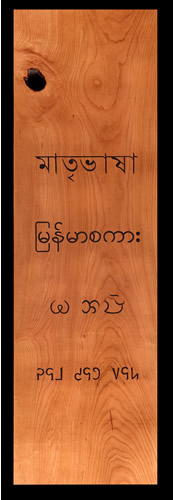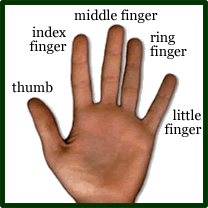Today we have a guest post by Tim Brookes.

As many of you know, February 21st is International Mother Language Day.
The day is especially important to the nation of Bangladesh, where the right to speak their own language was a vital part of their move to gain independence from Pakistan. IMLD was born as a recognition of what are known as “language martyrs” — students who were massacred by the Pakistani Army in 1952 for protesting the right to speak their mother tongue.
The Endangered Alphabets Project is contributing to this global observance by returning to these roots. I’ve carved the phrase “mother language” in the four principal alphabets of Bangladesh: Bangla (the official national language), and Chakma, Marma and Mro, three endangered indigenous languages.
As always, the hardest part was tracking down the text. Bangla was easy; Marma also, thanks to my friend and colleague Maung Nyeu who is an ethnic Marma. Chakma came through Facebook via Suz Moriz (Bivuti Chakma), who created what is now the standard Chakma font.
Mro was the hardest, as it not only has the fewest speakers but they tend to live in more remote areas of the forested, upland Chittagong Hill Tracts. When I’ve worked on collaborative projects over the past three years that involved Mro, getting translations often took weeks, and it took an intermediary heading out to Mro villages on foot.
Facebook, which is in a sense part of the problem by not supporting most indigenous glyphs, was in this case also the solution, as it put me in touch with several members of the Mro community living outside the Hill Tracts, including Rengwan Mro and Elisha Pan Mro.
Facebook also put me in touch with Shanjidul Alam Seban Shaan, a community organizer living in Chittagong, who in turn recommended several art galleries and exhibition spaces in the city, and knew many of the founders and owners personally—a great quality for a community organizer!
The carving and painting took a little under three weeks, and this morning I took a very large, heavy package to the post office, where the clerk balanced it on a very small scale and squinted under it to read the shipping cost on his screen.
If all goes well, the package will reach Chittagong in 10 days or so, and will become part of the country’s celebrations on the 21st, on display at Bistaar, an arts complex in Chittagong.
My hope is that this carving will be my most public work yet, and will become a visual symbol of the diversity of languages and cultures not only in Bangladesh but all over the world. A graphic designer friend is using the image of the carving to create a poster for Mother Tongue Day, which I hope to have available as a free download on my www.endangeredalphabets.com site within a few days.
As I was working on the carving, I set up a Kickstarter to cover the costs of materials and shipping, and support was so great we broke the initial goal of $1,000 in barely 24 hours.
But here’s the thing: it was only at that point I realized what a good and important idea this was. And as donations keep coming in, it strikes me that with every additional dollar we’ll be able to plan follow-up Mother Tongue carvings for 2017.
I’d love to make a Mother Tongue carving for Indonesia and the Philippines, both of which have multiple minority alphabets–and what about the mother tongues of the indigenous peoples of North America! I can just see it, a vast slab of wood tipped up on end, with the phrase “mother tongue” carved in dozens of languages indigenous to North America: Cree, Cherokee, Navajo …
I’d have to start now.
Tim Brookes is founder of the Endangered Alphabets Project:
https://www.kickstarter.com/projects/1496420787/mother-tongues


